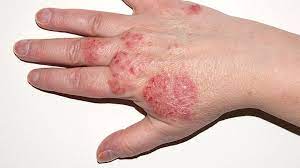Eczema is a chronic skin condition that affects millions of people worldwide. Characterized by red, itchy, and inflamed skin, eczema flare-ups can be not only uncomfortable but also emotionally distressing. Managing and minimizing these flare-ups is essential for those dealing with this condition. In this article, we’ll delve into effective strategies to combat eczema flare-ups and regain control of your skin health.
Understanding Eczema and Its Triggers
Before we dive into the tips for managing eczema flare-ups, let’s first understand the condition itself and what factors can trigger it.
What is Eczema?
Eczema, also known as atopic dermatitis, is a chronic skin disorder characterized by inflammation and intense itching. It often appears as red, scaly patches on the skin.
Common Triggers of Eczema Flare-ups
- Weather Changes: Extreme temperatures and low humidity can exacerbate eczema symptoms.
- Allergens: Allergic reactions to pollen, pet dander, or dust mites can trigger flare-ups.
- Irritants: Substances like harsh soaps, detergents, or perfumes can irritate the skin.
- Stress: Emotional stress can lead to eczema flare-ups.
- Foods: Certain foods, such as dairy or nuts, may worsen eczema in some individuals.
Tips for Minimizing Eczema Flare-ups
Now that we have a better understanding of eczema and its triggers, let’s explore practical ways to minimize flare-ups and enjoy healthier skin.
Choose Gentle Skincare Products
Opt for hypoallergenic and fragrance-free skincare products to reduce the risk of irritation. Moisturize regularly to maintain skin hydration.
Maintain a Consistent Skincare Routine
Consistency is key. Establish a daily skincare routine and stick to it. Cleansing, moisturizing, and applying prescribed medications should be done consistently.
Identify and Avoid Trigger Factors
Work with a dermatologist to identify specific trigger factors for your eczema. Once identified, take steps to avoid or minimize exposure to these triggers.
Keep Your Skin Hydrated
Dry skin can worsen eczema symptoms. Use a high-quality moisturizer to lock in moisture and create a protective barrier.
Manage Stress
Stress management techniques, such as meditation or yoga, can be beneficial in reducing eczema flare-ups triggered by emotional stress.
Dietary Adjustments
Consult a healthcare professional or allergist to determine if certain foods are exacerbating your eczema. Making dietary adjustments may help.
Conclusion
Managing eczema flare-ups is a proactive process that involves understanding your specific triggers and adopting a comprehensive approach to skincare and stress management. By following these tips, you can significantly reduce the frequency and severity of eczema flare-ups, allowing you to lead a more comfortable and confident life.
Frequently Asked Questions (FAQs)
- Is eczema curable?Eczema is a chronic condition with no known cure, but it can be effectively managed.
- Can I use over-the-counter creams for eczema?Over-the-counter creams may provide relief for mild cases, but severe eczema often requires prescription medications.
- How long does it take to see improvement in eczema symptoms?Improvement varies from person to person. Some may see results in weeks, while others may take longer.
- Are there any natural remedies for eczema?Some natural remedies, such as coconut oil or oatmeal baths, may offer relief, but consult with a dermatologist for personalized advice.
- Can stress really worsen eczema?Yes, stress can be a significant trigger for eczema flare-ups. Managing stress is an essential part of eczema management.
Remember, while these tips can help manage eczema, it’s essential to work closely with a dermatologist for a personalized treatment plan. Your journey to healthier skin starts with understanding your unique needs and triggers.

